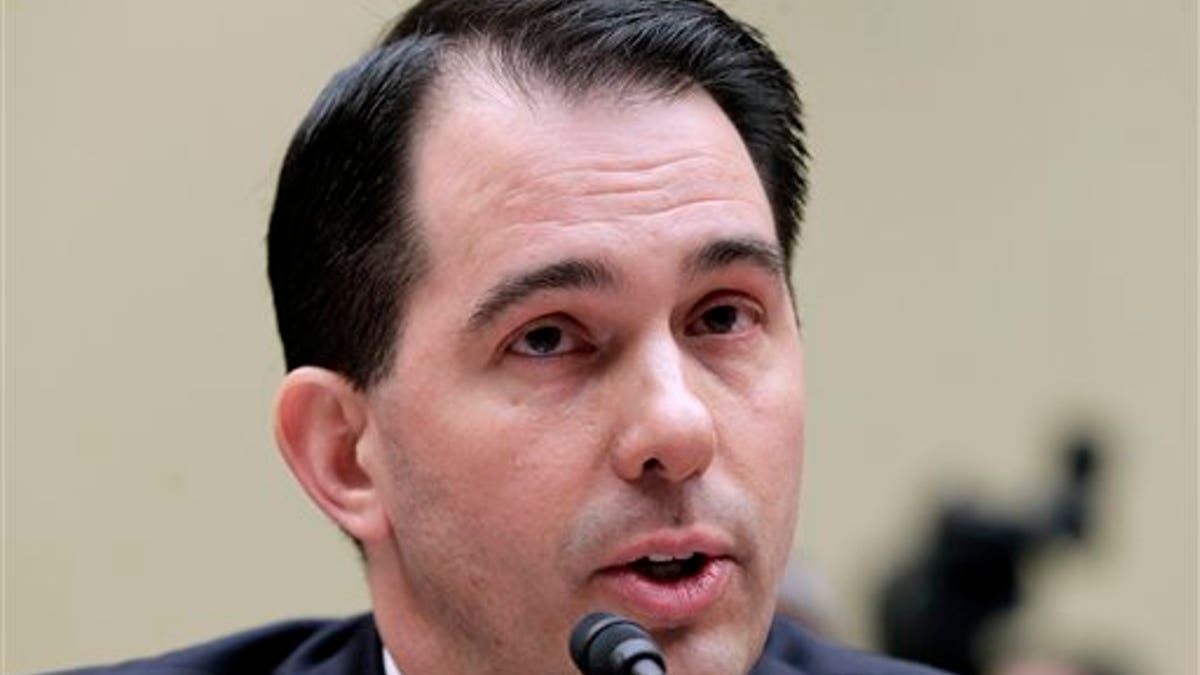
April 14: Wisconsin Gov. Scott Walker testifies on Capitol Hill in Washington, before the House Oversight and Government Reform Committee hearing to discuss the problems with balancing state budgets in a tough economy. (AP)
Thursday’s hearing before the House Oversight Committee was billed as a look at the tough budgetary choices states are facing, and who better to testify than Gov. Scott Walker, R-Wis.?
Committee Chairman, Rep. Darrell Issa, R-Calif., welcomed Walker and Gov. Peter Shumlin, D-Vt., who have faced many of the same fiscal challenges. “We look forward to hearing how they’re going to retain the viability of their states,” Issa said.
But, it was quickly apparent that most of the Democratic lawmakers on the Committee wanted to talk about something else entirely – namely Walker’s controversial legislation that would limit public employees’ collective bargaining power and require them to contribute more to their benefit plans.
Ranking Member Rep. Elijah Cummings, D-Md., wasted no time.
“It is shameful to play politics with American workers and their families,” he said. Cummings cautioned Walker that lawmakers shouldn’t “attack” public employees, urging him to instead embrace them as the “engine and author of the American recovery.”
Rep. Dennis Kucinich, D-Ohio, accused Walker of refusing to meet with union officials and demanded to know how requiring unions to hold annual membership votes would save Wisconsin any money. Walker acknowledged it wouldn’t have a direct affect on the state budget, but said it was part of the bigger picture: making sure employees are fully informed about how they will or won’t benefit if they opt for union representation.
Rep. Carolyn Maloney, D-N.Y., said of Walker’s plan, “It appears very much to me – and to others – to be ideologically and politically motivated.”
Walker held firm to his position that he had to make “progressive” choices in order to stem Wisconsin’s budgetary bleeding. He directly addressed plans to require state employees to make 5.8 percent contributions to their pensions. “Some here – and other places around the country – may say that’s a bold political move, but I would argue it’s a very modest request,” Walker testified.
Despite the chorus of critics at Thursday’s hearing, Walker’s supporters are pointing to one high-profile endorsement: Moody’s Investors Service. They assess the Governor’s plans this way: “If enacted, the budget will be credit positive for Wisconsin by bringing the state's finances closer to a structural budgetary balance."
Wisconsin Senate Republicans passed a version of Walker’s plan after Senate Democrats left the state and refused to return, but the story is far from over. Several legal challenges are now pending.
Today, there was a partial win for Walker’s supporters. A judge in Dane County,Wisconsin, ruled that two county leaders could not sue in their official capacity to stop the bill’s implementation.
Shumlin testified today that he believes there are less-divisive options available for solving state budget crises. “You don’t have to take on the basic principle of collective bargaining,” he said.
Instead of settling into a combative roll with firefighters, police officers and teachers Shumlin gave this advice. “Work together with them – with maple syrup, not vinegar.”




